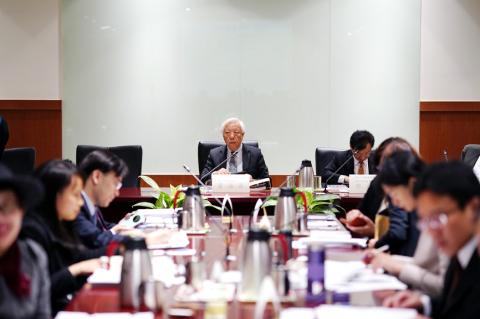A subcommittee of the national conference on judicial reform on Wednesday voted in favor of a motion to establish an independent evaluation mechanism with the authority to assess the performance of judges and remove unsuitable judges from courts.
Legal practitioners and members of the public have long expressed their concern over the perceived high number of so-called “dinosaur” judges in the nation’s judicial system.
Chiu Hei-yuan (瞿海源), a sociologist at Academia Sinica, presided over the subcommittee meeting, during which members deliberated on the suggestion to establish an independent mechanism to evaluate judges and to find ways to remove “dinosaur” judges.

Photo: Huang Hsin-po, Taipei Times
Yu Po-hsiang (尤伯祥), a defense lawyer for Sunflower movement activists, said that people who want to file an official complaint against a judge “have to go through the lawyers’ bar association, or through the Judicial Reform Foundation. If there are grounds for a valid case, then it is a protracted process, in which it is filed with the Judicial Evaluation Committee, which is under the Judicial Yuan.”
Kao Jung-chih (高榮志), the foundation’s representative on the subcommittee, said people have the right to a fair trial and the right to appeal perceived injustices or improper conduct by judges, but they cannot file such cases themselves, as the system deprives them of that right.
Kao had said in previous meetings that the Judicial Evaluation Committee has failed its mandate, adding that instead of serving the public, the committee serves to protect “dinosaur” judges, as most of its members have professional ties and came from the judiciary or legal practice circles.
“If someone could file for evaluation against a judge while a litigation was in progress, then the case would drag on for much longer. There is the likelihood of people abusing such a process,” Minister of Justice Chiu Tai-san (邱太三) said, voicing his opposition to the proposal.
Law professor Lin Yu-hsiung (林鈺雄) said he is also against the proposal.
“Only a few nations allow people to directly intervene in the judiciary or file complaints and request for an evaluation of judges. If we want people to trust the judicial system, then we should respect the evaluation results,” Lin said.
Chiu Hei-yuan, who is also the subcommittee convenor, called for a vote on whether to allow people to directly file for complaints against judges and whether to establish an independent evaluation committee with its own budget.
The proposal’s supporters won with 11 votes against nine.

US President Donald Trump said "it’s up to" Chinese President Xi Jinping (習近平) what China does on Taiwan, but that he would be "very unhappy" with a change in the "status quo," the New York Times said in an interview published yesterday. Xi "considers it to be a part of China, and that’s up to him what he’s going to be doing," Trump told the newspaper on Wednesday. "But I’ve expressed to him that I would be very unhappy if he did that, and I don’t think he’ll do that," he added. "I hope he doesn’t do that." Trump made the comments in

NOT AN OPENING: Trump’s violation of international law does not affect China’s consideration in attacking Taiwan; Beijing lacks capability, not precedent, an official said Taiwanese officials see the US’ capture of the president of Venezuela as a powerful deterrent to Beijing’s aggression and a timely reminder of the US’ ability to defeat militaries equipped with Chinese-made weapons. The strikes that toppled Venezuelan President Nicolas Maduro signaled to authoritarian leaders, including Chinese President Xi Jinping (習近平), US President Donald Trump’s willingness to use military might for international affairs core to US interests, one senior official in Taipei’s security circle said. That reassured Taiwan, the person said. Taipei has also dismissed the idea that Trump’s apparent violation of international law could embolden Beijing, said the official, who was not

A cold surge advisory was today issued for 18 cities and counties across Taiwan, with temperatures of below 10°C forecast during the day and into tonight, the Central Weather Administration (CWA) said. New Taipei City, Taipei, Taoyuan and Hsinchu, Miaoli and Yilan counties are expected to experience sustained temperatures of 10°C or lower, the CWA said. Temperatures are likely to temporarily drop below 10°C in most other areas, except Taitung, Pingtung, Penghu and Lienchiang (Matsu) counties, CWA data showed. The cold weather is being caused by a strong continental cold air mass, combined with radiative cooling, a process in which heat escapes from

Snow this morning fell on Alishan for the first time in seven years, as a strong continental cold air mass sent temperatures plunging across Taiwan, the Central Weather Administration (CWA) said. The Alishan weather station, located at an elevation of about 2,200m in central Taiwan, recorded snowfall from 8:55am to 9:15am, when the temperature dropped to about 1°C, the CWA said. With increased moisture and low temperatures in the high-altitude Alishan area, the conditions were favorable for snow, CWA forecaster Tsai Yi-chi (蔡伊其) said. The last time snow fell at the Alishan weather station was on Jan. 10, 2018, while graupel fell there